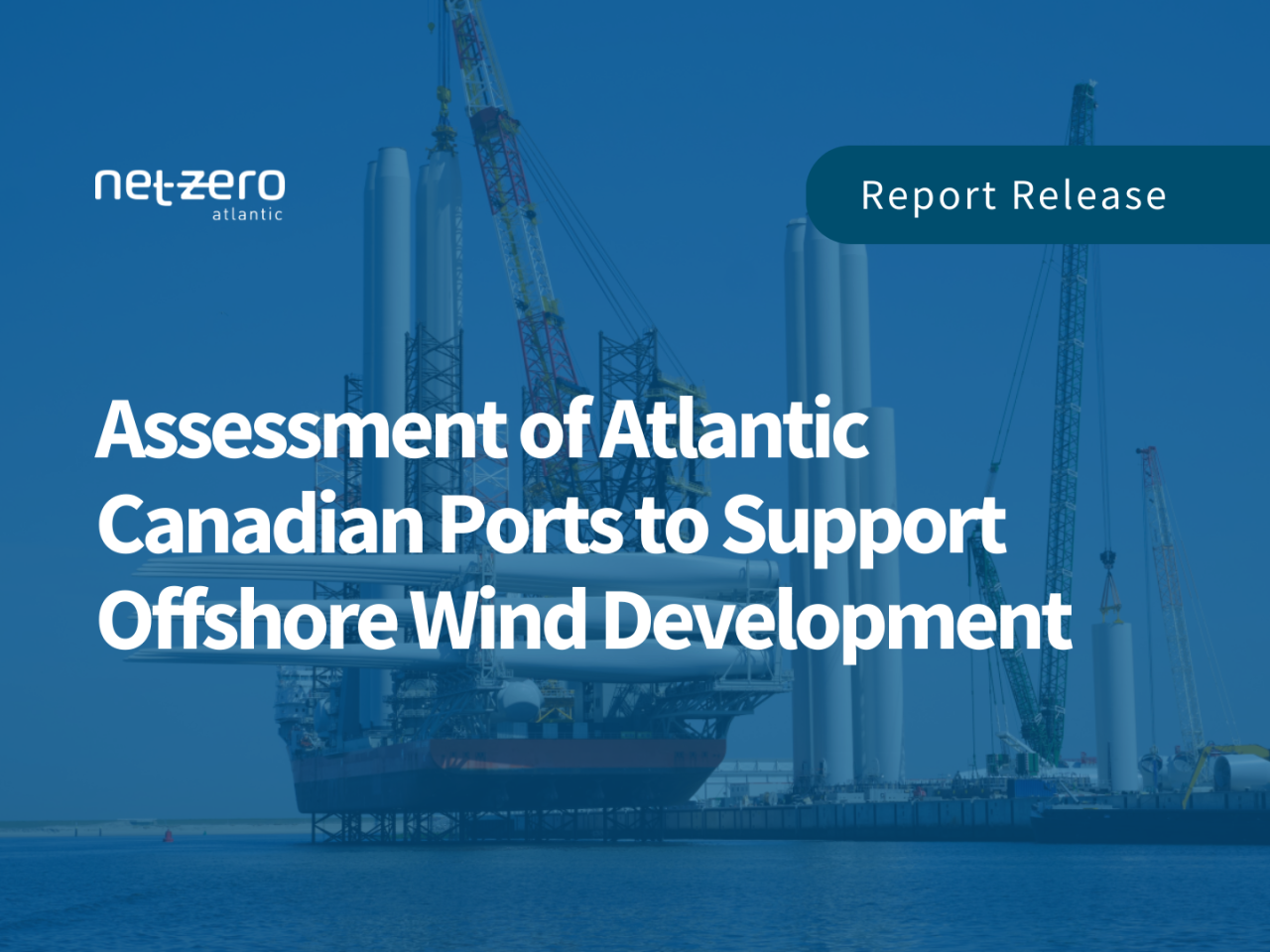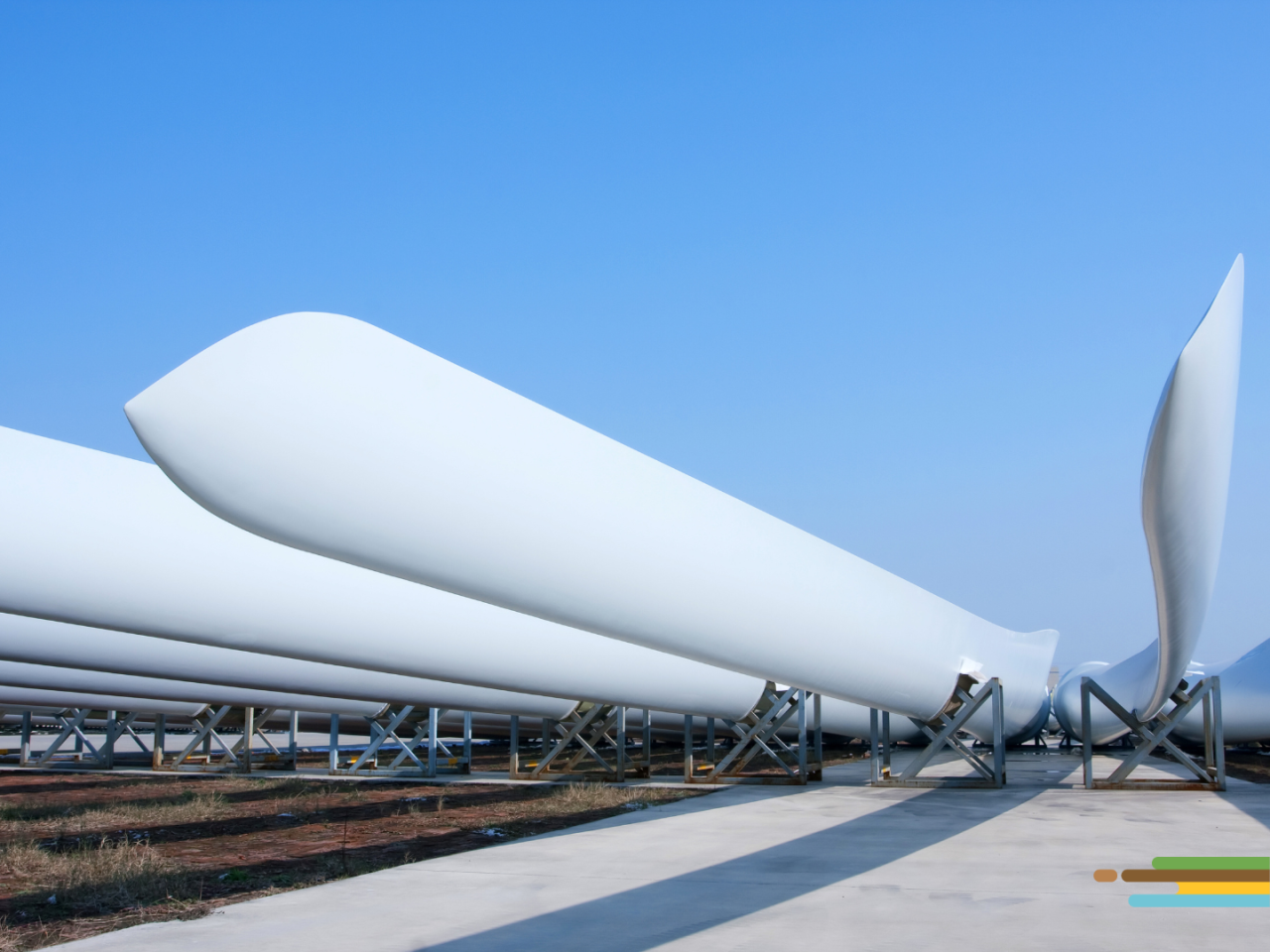
10 Ports in Atlantic Canada Have Potential to Be Primary Hubs for Offshore Wind Development
The final report for the Assessment of Atlantic Canadian Ports to Support Offshore Wind Development project is released now. The report provides a snapshot of Atlantic Canada’s port capabilities, highlighting 10 large ports that have the potential to serve as primary hubs for offshore wind projects in both domestic and US markets.
Offshore wind has significant potential to become a new source of low-carbon electricity for Atlantic Canada. Ports and suitable port infrastructure are key to successfully delivering offshore wind projects.
The challenge
There is a lack of publicly available information about port infrastructure to support offshore wind development in Atlantic Canada.
The objectives
The Assessment of Atlantic Canadian Ports to Support Offshore Wind Development project will highlight capabilities, identify gaps, and provide conclusions and recommendations related to potential involvement by Atlantic Canadian ports in offshore wind development.
How we addressed it
Net Zero Atlantic is a leading independent energy research organization advancing Atlantic Canada’s transition to a low-carbon future. We recognize ports as being essential to establishing the infrastructure needed to complete the energy transition underway now. We are assessing how ready our region’s port infrastructure is for the offshore wind industry.
The deliverables
The project will provide:
- current offshore wind industry and market conditions
- anticipated timelines for project development
- forecasted demand for port services
- port requirements to enable fixed-bottom and floating wind turbines
- profiles of participating ports, including self-defined development plans
- comparison of available and proposed port infrastructure to benchmark requirements for fixed base and floating turbines
Why now?
To prepare for potential future offshore wind development, stakeholders need practical information about existing port infrastructure and necessary upgrades. Results of this assessment will be useful for ports, investors, developers, and other stakeholders with an interest in offshore wind development in Atlantic Canada.
Ports involved in the assessment
The focus of this study has been the achievement of a high-level assessment of primary ports capable of supporting the OSW market.
There are two types of ports required, primary and secondary offshore wind ports. This assessment focuses on the primary port needs, including fixed bottom OSW marshalling port, floating OSW staging and integration port, floating foundation assembly port and a combined floating OSW assembly and staging and integration port. This study does not explore secondary ports such as operations and maintenance, cable storage and loadout facilities, mooring chain/rope and anchor handling facilities, or manufacturing facilities.
More About the Project
In July 2024, the project began. Net Zero Atlantic has partnered with Canada's Ocean Supercluster and three offshore wind developers – Northland Power, Simply Blue Group, and Nova East Wind Inc. - to complete an Assessment of Atlantic Canadian Ports to Support Offshore Wind Development research project.

What’s next?
Final report was completed in August 2025, including an appendix of port specific profiles.
Past activities
- June 2025 – Ports identified in a shortlist and engaged to provide and validate information regarding their ports.
- April 2025 – Completed screening of all port data submissions.
- February 2025 – Call for submissions was launched with a virtual information session. Recording of the session to come. Watch a recording of the session.
- November 2024 - Moffatt & Nichol was contracted as the consultant. The primary investigators are leaders in port infrastructure for offshore wind and have brought to the project the following secondary investigators: Xodus, Caron Hawco Group, Angler Solutions, and Envigour.
- October 2024 - An RFP was released for the research project, Assessment of Atlantic Canadian Ports to Support Offshore Wind Development.
Following a desktop review and an open intake process, the following ports were identified as meeting the minimum technical requirements, as set out by the project team, to serve as a primary offshore wind port and have indicated their interest in participating in the study.
|
Port |
Province |
|
Port Hawkesbury Paper |
Nova Scotia |
|
Novaporte |
Nova Scotia |
|
Atlantic Canada Bulk Terminal |
Nova Scotia |
|
Port of Sheet Harbour |
Nova Scotia |
|
Melford International Terminal |
Nova Scotia |
|
Port of Belledune |
New Brunswick |
|
Port of Saint John |
New Brunswick |
|
Port of Argentia |
Newfoundland and Labrador |
|
Port of Mortier Bay |
Newfoundland and Labrador |
|
Channel Port aux Basques |
Newfoundland and Labrador |
Net Zero Atlantic partnered with three offshore wind developers – Northland Power, Simply Blue Group, and Nova East Wind Inc. – to coordinate the assessment of port infrastructure availability in Atlantic Canada and the necessary infrastructure upgrades to serve the emerging offshore wind industry. In Fall 2024, they contracted the firm Moffatt & Nichol – leaders in port infrastructure for offshore wind – as the primary consultant to carry out the assessment. Supporting Moffatt & Nichol in carrying out this project are Xodus Group, Caron Hawco Group, Angler Solutions, and Envigour.
The project benefitted from expert involvement from a number of organizations. The assessment was led by Net Zero Atlantic in partnership with three offshore wind developers – Northland Power, Simply Blue Group, and Nova East Wind Inc. They contracted the firm Moffatt & Nichol, leaders in port infrastructure for offshore wind, as the primary consultant carrying out the assessment. Moffatt & Nichol was supported by offshore wind supply chain experts from Xodus Group, while local consultants Caron Hawco Group, Angler Solutions, and Envigour contributed essential regional insights and expertise.
The focus of this study was a high-level assessment of primary ports capable of supporting the OSW market.
Ports that met the technical requirements were considered to take part in the assessment. Details around the screening process were shared in a virtual information session, and updates on the process were provided on this project page.
There are two types of ports required, primary and secondary offshore wind ports. This assessment focused on the primary port needs, including fixed bottom OSW marshalling port, floating OSW staging and integration port, floating foundation assembly port and a combined floating OSW assembly and staging and integration port. This study did not explore secondary ports such as operations and maintenance, cable storage and loadout facilities, mooring chain/rope and anchor handling facilities, or manufacturing facilities.
We apologize if you did not receive notice about the project, especially our information session. We made efforts to inform ports across Atlantic Canada about this assessment through Net Zero Atlantic’s extensive database, direct emails to ports with potential offshore wind capacity, and outreach to government and industry stakeholders.
Ports and suitable port infrastructure are key to successfully delivering offshore wind projects. Ports that serve offshore wind functions may receive economic opportunities that will benefit the regions in which they are based.
Contact us
For media inquiries, please contact info@netzeroatlantic.ca
